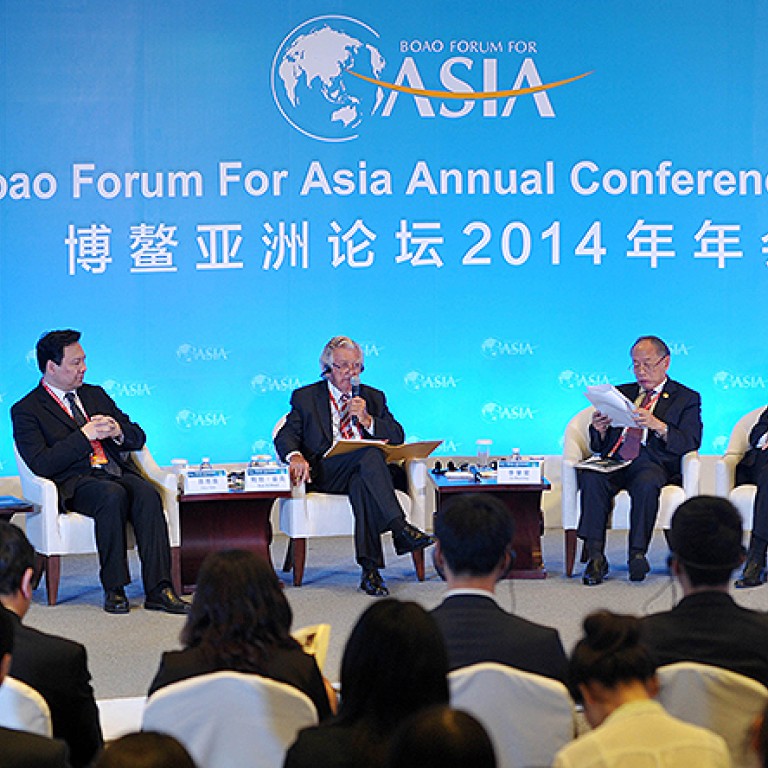
China must resist the temptation of economic stimulus for quick relief
Hu Shuli says with calls growing to arrest the slowdown, policymakers must not lose sight of the more vital goal of long-term development
The Boao Forum, held every April after the end of China's annual legislative meetings, offers yet another window into the country's policy directions. In his opening speech last Friday, Premier Li Keqiang ruled out using stimulus measures to counter economic fluctuations, saying healthy, long-term development was more important for China.
This was the second time he has made the point. At the close of the National People's Congress session last month, he told reporters he was satisfied that the government had refrained from using stimulus measures to meet growth targets in 2013. "Why can't we do the same this year?" he asked then.
Since that time, weaknesses in the economy have been laid bare: we've seen the rising risk of trust product defaults, troubles in the steel and coal industries, and even a few isolated cases of bank runs.
True, the March data showed some improvement, but forecasts for first-quarter growth continue to hover at around 7.2 and 7.3 per cent, lower than the annual target. No wonder the cries for stimulus are growing louder.
Why, then, is the government standing firm?
We believe its decision is based on an accurate assessment of China's development needs and current fragilities. Despite years of talk about the need for economic restructuring, it has continued to rely on an unsustainable, investment-led model of growth. A change is long overdue.
Besides, 2014 isn't 2008, when the government rolled out the 4-trillion-yuan stimulus package (HK$4.5 trillion at exchange rates then). Today, the country's basic infrastructure has improved, particularly in the more developed regions. Local government debt has surged, and the overall debt-to-GDP ratio is too high.
Moreover, both the money supply and the financial sector have grown substantially, limiting the range of the government's fiscal and monetary tools; a single wrong move could spark a crisis of excess capacity, inflation and bad debts.
Given these considerations, the government's approach to shoring up growth has been to hasten investment projects that are in the pipeline, rather than initiate more of them. On the same day that Li spoke at Boao, the media reported on five provinces undertaking projects worth 7 trillion yuan (HK$8.8 trillion), but a closer reading showed that these projects aren't new, nor are they expected to be completed soon.
So far, both the central and local governments have not overreacted to the lacklustre economic data. But if the economic picture gets uglier, how long will officials be able to resist demands for a short-term boost? To stimulate or not to stimulate - with so many interests at stake, we can expect the battle of wills to persist.
As Li puts it, gross domestic product growth of around 7.5 per cent this year will be acceptable as long as employment remains stable. This departure from the usual official pursuit of numerical goals is a breath of fresh air. Yet both the 18th Central Committee and the more recent government work report have continued to issue these targets. Reconciling the two will be a test for the government.
Perhaps the best reason for eschewing short-term stimulus measures is China's growth potential. The impetus for growth can come from reform, restructuring and improving people's livelihoods, Li has said. And to rev up this engine of growth, China must implement the comprehensive reform it has pledged.
The government has recently launched measures to streamline its administration, promote the service industries, and expand its tax incentives for small and medium-sized enterprises; all of these can spur private investment. However, without reform of state-owned enterprises that dominate the market, there is little chance the measures can be effective. An unfair playing ground will continue to impede the growth of the private sector, particularly in the financial industry. This means credit for small businesses will continue to be hard to come by.
The government's recent move to allow the bond default of solar panel maker Shanghai Chaori was indeed notable, but official decisions on a bailout appear to be selective. The question to ask is: would the government allow a state-owned enterprise to similarly default?
Moreover, official opinion on how well China can handle a downturn appears to be split. In a recent report evaluating the implementation of the 12th five-year plan, the National Development and Reform Commission said China has less room to rely on policy tools to support the economy. Even so, it has pledged to improve the market structure and business environment, foster competition and promote enterprise.
Putting the pledge into action is far harder, of course. There'll be plenty of naysayers. But the Chinese government should know that, despite the prognosis of gloom by international analysts, the health of the economy rests in its own hands, and reforms are the key.

